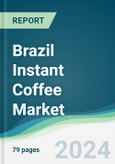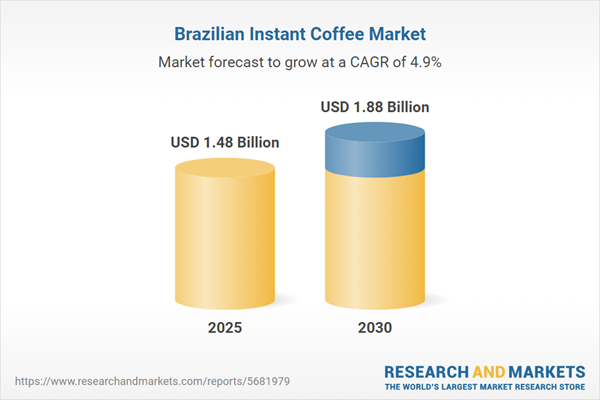The market growth is due to the growing population and their need for convenient items. Further, to meet the needs of the expanding middle-class population, regional businesses are developing fresh, cutting-edge products. The abundance ofinstantcoffeein pouch form available in the stores shows a significant market demand among residents. Furthermore, the market has strong growth prospects throughout the projected period because coffee is Brazil's second-most popular beverage.
Additionally, smooth, nutty, and mildly chocolaty flavor profiles have been conventionally associated with Brazilian coffee beans, hence reflected in instant coffee. The intensity may differ with variations in roasting and blends. Brazil is an important coffee-producing country with numerous brands selling instant coffees made from Brazilian beans. Brazilian instant coffee is available in large worldwide chains as well as from top specialty roasters.
Furthermore, according to the World Coffee Association, Brazil is the world's second-largest domestic coffee consumer and the country with the greatest domestic consumption among coffee-producing nations. These certain factors are expected to drive the market growth.
Brazil instant coffee market drivers
Growing demand for conveniently made coffee is predicted to fuel the instant coffee demand in Brazil.Instant coffee has grown in popularity in recent years due to its mobility and convenience. These drinks are convenient to consume while traveling or on the go. Consumption of instant coffee products is rising among millennials and professionals because they offer benefits including energy, freshness, and antioxidants.
Brazilian consumers are increasingly turning to coffee beverages as a better substitute for sugary fizzy drinks as the emphasis on health and well-being grows. Many coffee beverage producers are inventing and diversifying their product offerings to cater to this expanding market of health-conscious consumers. In addition to the classic coffee flavors, they add fresh and distinctive flavors like floral undertones and other unprocessed flavors to cater to younger customers seeking out novel tastes.
According to the National Supply Company (Companhia Nacional do Abastecimento (CONAB), Brazil's coffee industry generated USD 11.81 billion in revenue in 2022. Additionally, coffee production reached 28.9 bags per hectare in 2023, up from the 27.7 bags per hectare observed in 2022 resulting in high demand for instant coffee in Brazil.
Reasons for buying this report:
- Insightful Analysis: Gain detailed market insights covering major as well as emerging geographical regions, focusing on customer segments, government policies and socio-economic factors, consumer preferences, industry verticals, other sub-segments.
- Competitive Landscape: Understand the strategic maneuvers employed by key players globally to understand possible market penetration with the correct strategy.
- Market Drivers & Future Trends: Explore the dynamic factors and pivotal market trends and how they will shape up future market developments.
- Actionable Recommendations: Utilize the insights to exercise strategic decision to uncover new business streams and revenues in a dynamic environment.
- Caters to a Wide Audience: Beneficial and cost-effective for startups, research institutions, consultants, SMEs, and large enterprises.
What do businesses use our reports for?
Industry and Market Insights, Opportunity Assessment, Product Demand Forecasting, Market Entry Strategy, Geographical Expansion, Capital Investment Decisions, Regulatory Framework & Implications, New Product Development, Competitive IntelligenceReport Coverage:
- Historical data & forecasts from 2022 to 2030
- Growth Opportunities, Challenges, Supply Chain Outlook, Regulatory Framework, Customer Behaviour, and Trend Analysis
- Competitive Positioning, Strategies, and Market Share Analysis
- Revenue Growth and Forecast Assessment of segments and regions including countries
- Company Profiling (Strategies, Products, Financial Information, and Key Developments among others)
The Brazil instant coffee market is segmented and analyzed as follows:
By Type
- Freeze-Dried Instant Coffee
- Spray-Dried Instant Coffee
- Others
By Distribution Channel
- Offline
- Retail
- Foodservices
- Online
By Province
- Minas Gerais
- Sao Paulo
- Bahia
- Others
Table of Contents
Companies Mentioned
- Nestle
- Golden Bean Trade
- Pilao Coffee Traditional Roast and Ground
- BRAZILIAN SANTOS Whole Bean Coffee
- Black Rifle Coffee Ground
- Starbucks Brazil Blend
- Peet's Coffee
Table Information
| Report Attribute | Details |
|---|---|
| No. of Pages | 79 |
| Published | December 2024 |
| Forecast Period | 2025 - 2030 |
| Estimated Market Value ( USD | $ 1.48 Billion |
| Forecasted Market Value ( USD | $ 1.88 Billion |
| Compound Annual Growth Rate | 4.8% |
| Regions Covered | Brazil |
| No. of Companies Mentioned | 7 |









